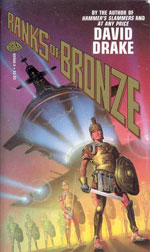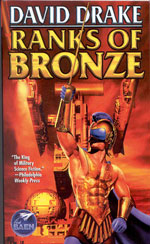 RANKS OF BRONZE arose from two bits of knowledge I ran into while I was an undergraduate. I don’t know which came first, but I wouldn’t have written the story–and the later novel–without both occurring.
RANKS OF BRONZE arose from two bits of knowledge I ran into while I was an undergraduate. I don’t know which came first, but I wouldn’t have written the story–and the later novel–without both occurring.
I read all of Horace then for the first time. In an Ode he bewails the disgrace of Roman soldiers captured in Parthia taking foreign wives and being lost forever to their fatherland. At about the same time I read that, I learned in my Chinese history course that when China expanded westward during the Former Han Dynasty, Chinese troops in the neighborhood of modern Nepal met and defeated mercenaries equipped in what appears to be Roman fashion. It’s possible that the troops were prisoners whom the Parthians captured at Carrhae in 56 BC and sold eastward as military slaves (like the Mamelukes of a later day).
I found Horace’s lament very moving and speculation about the Roman prisoners being sold as a fighting force fascinating. The ideas bounced around in my head until in 1975 I wrote a very tight little story, Ranks of Bronze, in which the purchasers weren’t Nepalese but rather star-travellers and the Romans’ alien wives were very alien.
Jim Baen loved the story. Perhaps by chance, Galaxy actually paid me before publication, the only time that happened. (Five months later was the normal course of business.) When I read the printed version, I found Jim had added a couple hundred words of exposition. It made the story better, and I didn’t go ballistic. (Getting paid early had probably mollified me.)
I’d done a lot of research on a 3500-word story, including buying and reading a Latin text of Vegetius. There was no economic justification for so much labor on a short story, but I wasn’t writing as an economic endeavor. The care helped make Ranks a very good story.
 When Jim started Baen Books, he asked me to turn Ranks into a novel. It took me a while to figure out that I could do tale as a series of campaigns. When Janet Morris reminded me of The Battle of the Frogs and the Mice, a work attributed to Hesiod, the last bits fell into place.
When Jim started Baen Books, he asked me to turn Ranks into a novel. It took me a while to figure out that I could do tale as a series of campaigns. When Janet Morris reminded me of The Battle of the Frogs and the Mice, a work attributed to Hesiod, the last bits fell into place.
I wrote the book. It’s one of my most artistically successful novels, and it sold well besides. And you remember all that research I did that made no economic sense? Because I’d gone to the effort to begin with, I could expand the story into a novel very easily. Doing a job right the first time should be its own justification, but I’ve found that not infrequently the universe decides to put money in your pocket also.
Frequently people have suggested that I do a sequel to Ranks. (Jim Baen most often.) I wrote the book as a story of growing up, a Bildungsroman. At the end of the novel, the viewpoint character has become a man and there’s no story to continue from that point. That’s my opinion.
Jim kept asking. Finally he suggested that I edit a shared universe anthology based on Ranks, and in a moment of weakness I agreed. The story I wrote for the anthology involves wholly different characters from the novel, but both Eric Flint and Steve Stirling continued my original characters. The folks who wanted a direct sequel will get their wish.
—Dave Drake
Ranks of Bronze. 1986, Riverdale, NY: Baen. 314 p. 067165568X (pb). $3.50.
————– “Ranks of Bronze (extract)” Far Frontiers Vol. V, J. E. Pournelle, J. Baen and E. Mitchell, Editors.
————– 2001, Riverdale, NY: Baen. 314 p. 0671318330 (pb). $5.99.